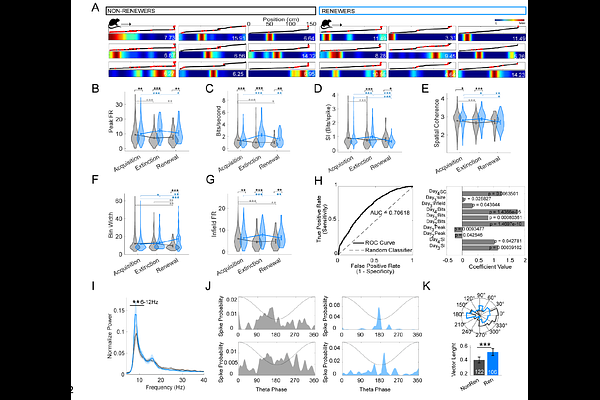Place cell activity and behaviour during task acquisition and extinction learning predict renewal outcome

Place cell activity and behaviour during task acquisition and extinction learning predict renewal outcome
Dolon Vera, L.; Donoso, J. R.; Cheng, S.; Manahan-Vaughan, D.
AbstractExtinction learning (EL) and the subsequent renewal of learned behaviours are crucial for adaptive responding, yet the underlying neural mechanisms that differentiate successful renewal from its absence remain unclear. Here, we explored the behavioral and neurophysiological basis of spatial appetitive EL, as well as renewal failure and renewal success. We recorded place cell activity from hippocampal area CA1 in male rats that performed a context-dependent spatial appetitive learning task in a T-maze (rewarded context A), followed by EL (unrewarded context B), and subsequent renewal testing (unrewarded context A). Half of the animals exhibited significant renewal (renewers) and the other half failed to renew (non-renewers). Our findings reveal fundamental differences in learning strategies between groups revealed by differences in both spatial behavior and in place cell activity during both initial acquisition and subsequent EL. Specifically, renewers exhibited a context-based EL strategy, whereas non-renewers followed a goal-directed strategy. The spatial distribution of hippocampal place cell activity differed significantly between groups, indicating the hippocampus\' role in the learning processes. Furthermore, renewers exhibited a greater extent of global remapping of place cells compared to non-renewers, consistent with predictions by our computational modeling. This suggests that global remapping serves as a key neural mechanism underlying effective renewal, allowing for the segregation of distinct memories and preventing the generalization of extinction. Our results highlight how hippocampal place cell dynamics during acquisition and EL predict later behavioral renewal outcomes, providing critical insights into the neural basis of memory updating and contextual control over learned behaviors.